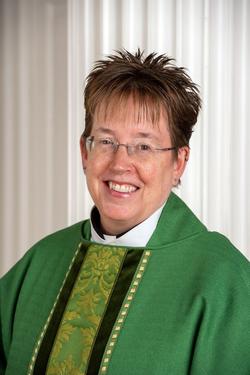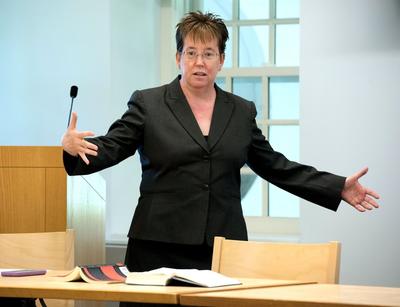By John Stoehr
Professor of Homiletics Carolyn Sharp says she’s been teaching at Yale Divinity School since “forever.” But that hasn’t kept her from designing something fresh and new.
This semester is the first time the Hebrew Bible scholar and Episcopal priest has taught a course on “preaching for creation.” Called Envisioning Shalom, the 800-level course asks students to find “ways to bear witness to the inherent value of Earth as a living and interconnected community that teaches us profound theological and ethical truths.”
 Sharp ‘94 M.A.R., ‘00 Ph.D. designed the course to give advanced divinity students occasion to study sermons on nature as well as poetry and memoir-writing as sources of moral wisdom. It is also a forum, Sharp said, by which they can “advocate for creation” and “engage in the work of healing and wholeness.”
Sharp ‘94 M.A.R., ‘00 Ph.D. designed the course to give advanced divinity students occasion to study sermons on nature as well as poetry and memoir-writing as sources of moral wisdom. It is also a forum, Sharp said, by which they can “advocate for creation” and “engage in the work of healing and wholeness.”
“Together,” reads the Fall 2019 syllabus, “we will listen for the Gospel in sermons focused on creation; we will explore the potential of micro-homilies to build the capacity of faith communities for ecotheological reflection and creation care.”
“Our planet is in peril,” Sharp said during a recent interview in her tidy office at YDS. “If we don’t become more deeply connected to all different aspects of creation, the planet is going to die. I want students to communicate that to their congregations. I want them to be a catalytic witness for hope. I want them to be so passionate about creation they can hardly hold back. We need to build a community of grace, and preaching is an important way to do that.”
She recited from Isaiah 35:
The wilderness and the dry land shall be glad;
the desert shall rejoice and blossom;
like the crocus it shall blossom abundantly,
and rejoice with joy and singing….
For waters shall break forth in the wilderness,
and streams in the desert;
the burning sand shall become a pool,
and the thirsty ground springs of water.
Sharp’s focus in the class has Scriptural roots. But, like a lot of things, it’s personal, too.
Sharp has been an ethical vegetarian for more than 20 years. To honor other living creatures, she said, it’s important for her not to eat them. “Animals are beautiful and precious beings. I hope we can learn to protect creation.”
Her focus on animals goes beyond her diet. She is “especially passionate” about stopping the “maiming and butchering of animals.” Puppy mills, animal experimentation, and hunting for sport are three key areas of concern. “We have got to stop this untold suffering,” she said. “If we can stop some suffering, then we should try to. It’s a moral obligation.”
The class is personal for another reason. For most of her career, Sharp has been a scholar of the Hebrew Scriptures. Her latest book is a commentary on Joshua. Forthcoming is a commentary on Jeremiah. Past books include: Irony and Meaning in the Hebrew Bible (2009); Wrestling the Word: The Hebrew Scriptures and the Christian Believer (2010); The Oxford Handbook of the Prophets (edited, 2016) and Feminist Frameworks and the Bible: Power, Ambiguity, and Intersectionality (co-edited with L. Juliana Claassens, 2017). Sharp has been preaching regularly since 1992 and preaches these days at St. John’s Episcopal Church in Essex.
 For many years, pursuing homiletics as an academic discipline hadn’t been in the cards. But she found that she wanted to learn as much as she could about Christian witness. She said: “I cherish the Hebrew prophets, and I adore exploring ancient Hebrew poetry and narrative. But a new horizon beckoned. I gained clarity about my deep yearning to explore Christian tradition for contemporary communities. Life is short, and I want to give everything I have to teaching about grace and mercy.”
For many years, pursuing homiletics as an academic discipline hadn’t been in the cards. But she found that she wanted to learn as much as she could about Christian witness. She said: “I cherish the Hebrew prophets, and I adore exploring ancient Hebrew poetry and narrative. But a new horizon beckoned. I gained clarity about my deep yearning to explore Christian tradition for contemporary communities. Life is short, and I want to give everything I have to teaching about grace and mercy.”
In homiletics, the art of preaching, Sharp could tap into her understanding of the Hebrew Scriptures while pursuing her passion for the Christian Gospel. “As an idealist, I care about community and relationships. As a feminist, I care about justice. And as a Christian, I find that the New Testament, and especially the four gospels, offer rich traditions for thinking about justice, healing, and mercy.”
Envisioning Shalom asks students to leap into their faith. They not only study sermons and writings on nature; they practice preaching and learn how to listen to one another. In doing so, Sharp said, they “learn more fully how to come to voice.” She said preaching is a mode of wisdom for going more deeply into the holy. She hopes students find ways to free themselves to become fully who they are called to be.
By email, Sharp expounded on what she calls “emancipatory pedagogy”: “I aim always to teach in ways that are emancipatory, inviting students to voice their convictions, including dissent, in ways that bear witness to their lived experience and their understanding of the truth.
“Emancipatory pedagogy is important to me. Power can so easily be misused. I work hard to create a different kind of classroom experience.”
In teaching homiletics, Sharp has students do things they’d never do in a biblical studies course. Envisioning Shalom stresses poetry and memoir writing. Sharp asks students to produce a piece of personal writing that’s as long as 2,700 words. “This assignment,” says the Fall syllabus, “is designed to deepen your capacity to integrate your lived experience and naturalist attention. That capacity will be vital for preaching that honors Earth and advocates for shalom.”
One final aspect of preaching as a mode of wisdom is bearing witness. The preacher, she said, makes harms to the world visible, and preaching calls others to account. But to do that, the preacher must have a vision of the good life, or shalom.
“How do we envision shalom?” the professor said. “As the flourishing of safety and wellbeing, as the minimizing of distrust in others not like ourselves. Preaching must help people build community, and it should guide them toward the experience of grace we encounter at the Communion table. We don’t talk about that enough in the public square.”
“We must have an understanding of shalom in order to work toward it,” Sharp said. “That means combating economic inequities and standing in solidarity with those who are marginalized for reasons of race, sex, or gender. The preacher should help people imagine a community that is living in love, not one that’s living in mistrust and fear and resentment. What does ‘radical love’ mean if it’s not for every living being?”